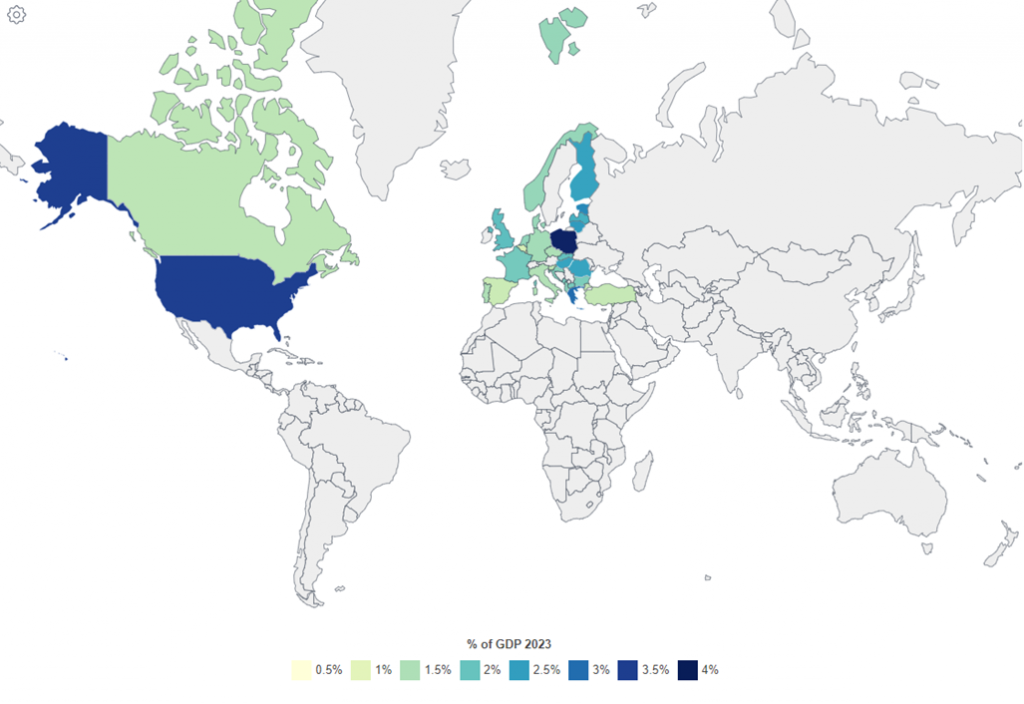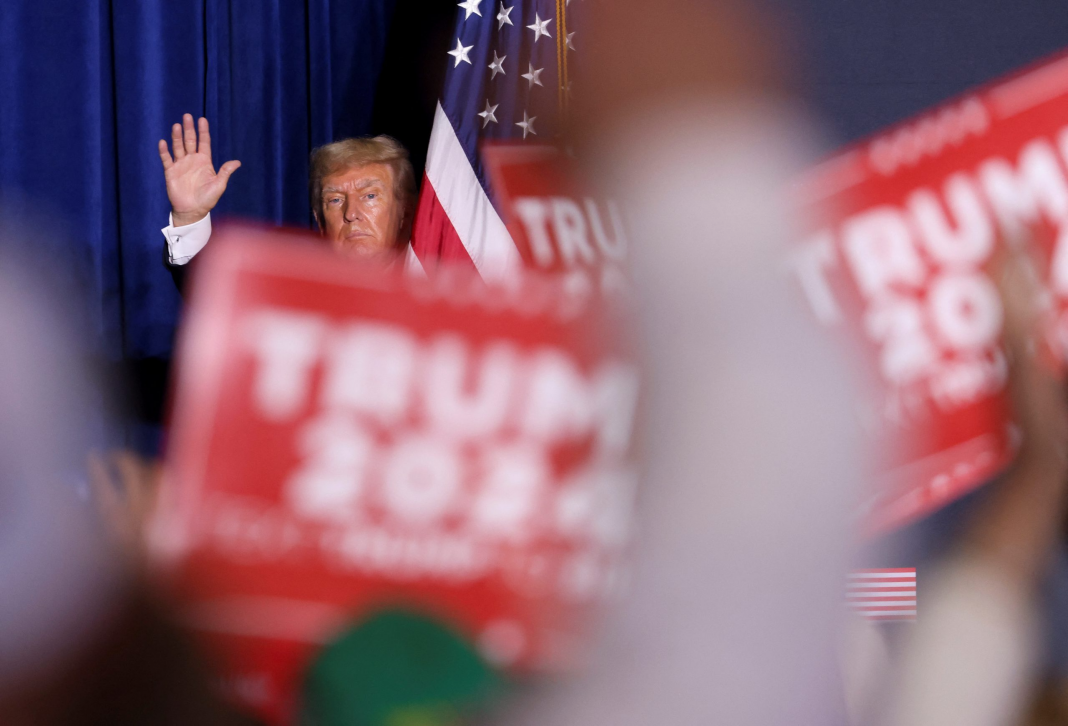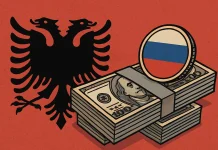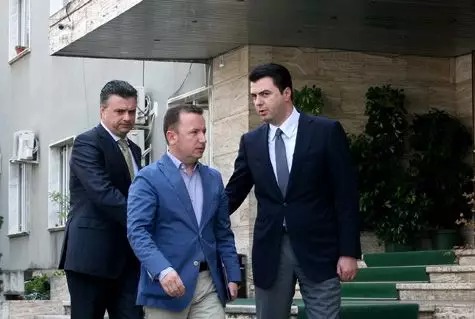Donald Trump, a Candidate for President of the United States, shook things up this time with the declaration that the USA will not defend any NATO member that ‘hasn’t paid the bills.’ The White House and the EU condemned Trump’s message, which went even further by threatening to ‘encourage Russia to do as it pleases’ with ‘delinquent’ states. Even NATO Secretary General Stoltenberg argued the conviction that the USA will continue to be a steadfast ally of NATO. The ‘bill’ mentioned by Trump is 2% of GDP that Alliance Members have agreed to pay each year, but this is not an exclusive condition for collective defense, which undermines Trump’s narrative. However, the Diplomat, Agim Nesho, warns that Trump’s provocation conveys a message to Europe.
Jona Plumbi
Former President of the United States, Donald Trump, has stated that he will ‘encourage’ Russia to attack any US NATO Ally that he considers has not fulfilled its financial obligations to the alliance.
‘NATO was a mess until I came along,’ Trump said at a rally in Conway, South Carolina. The Republican Candidate for the November Presidential Elections in America continued by recounting a conversation he claimed to have had with the President of a Major State.
‘I said: – Everyone has to pay.’ They said, ‘What if we don’t pay, will you continue to defend us?’ I said, ‘Absolutely not.’ They couldn’t believe the answer, – stated Trump.
He kept going with his speech in front of his supporters, indicating that the president of the large state asked him, ‘If I haven’t paid and Russia were to attack me, would the USA defend me? ‘You haven’t paid? Are you a defaulter?’ Trump asked. ‘Well then, no, I wouldn’t defend you. In fact, I’d encourage Russia to do whatever the hell it wanted. You’ve got to pay!” Trump concluded.
Even though this conversation attributed to Trump cannot be verified, what is verifiable is that member states failing to pay 2% of Gross Domestic Product to NATO cannot be deemed in violation of the rules, thereby undermining the narrative of the former Republican President.
Media coverage and official reactions
Trump’s statement dominated headlines worldwide. Albanian media also raised the alarm by reporting that Trump would encourage Russia to attack NATO, an exaggerated interpretation of the former president’s statement.



European and American officials’ reactions were immediate.
The White House described Trump’s statement as crazy and dangerous.
‘Encouraging the invasion of our closest allies by murderous regimes is terrifying and insane — this jeopardizes American national security, global stability, and our economy.‘.
Jens Stoltenberg, NATO’s Secretary General, stated that any suggestion that allies would not defend each other undermines our collective security, including that of the United States, and puts American and European troops at increased risk. Stoltenberg continued to say that regardless of who wins the presidential elections, the United States will remain a strong and dedicated NATO Ally.
The truth is that Trump’s statement, addressing ‘NATO states that do not pay’, is confusing. This is because the demand for investment at the 2% of GDP level, established by NATO since 2014, is not a ‘membership fee’ and is not mandatory for member states of the alliance.
According to the Diplomat, Agim Nesho, Trump makes such statements in electoral rallies because he considers NATO outdated and a burden for America.
‘President Trump has considered NATO as an outdated and irrelevant organization, sustained by American funds. As a champion of the ‘America First’ doctrine, President Trump values this organization as one that has fulfilled its mission. Trump has seen Europe’s defense architecture as a cost to the American economy, while Europeans have long been working for the prosperity of their population, taking American aid for granted.’
Arguments against Trump from NATO’s Secretary General
In a press release dated February 15th, NATO Secretary General Jens Stoltenberg provided an extensive explanation of the situation. In the statement, he listed three reasons why the US is an unwavering ally of NATO.
‘Firstly, it is in the national security interest of the United States of America to have a strong NATO. Secondly, there is indeed broad bipartisan support for NATO in the United States. Thirdly, the criticisms in the United States are not aimed at NATO, but at member countries that do not spend enough money on NATO. We have a very beautiful story to tell about this,’ said Stoltenberg.
He continued to explain that for years, the argument from the US that European allies and Canada were not spending enough on NATO persisted. ‘But things have changed,’ Stoltenberg emphasizes, noting that with the increase in defense spending by Canada and Europe, and with record investments in these countries, more and more allies are meeting the target of investing 2% of GDP.
‘The USA constitutes a quarter of the Global Gross Domestic Product. Alongside NATO allies, we represent 50% of the global economic power and 50% of the global military power. This is precisely in the interest of the USA, argued Stoltenberg.
What does Article 5 of NATO’s rules stipulate
The principle of collective defense is at the core of NATO’s founding treaty. It remains a unique and enduring principle that binds members together, committing them to defend each other and fostering a spirit of solidarity within the Alliance.
Article 5 provides that if a NATO Ally is the victim of an armed attack, each and every other member of the Alliance will consider this act of violence as an armed attack against all members and will take the actions it deems necessary to assist the Ally attacked.
Article 5
‘The Parties agree that an armed attack against one or more of them in Europe or North America shall be considered an attack against them all and consequently they agree that, if such an armed attack occurs, each of them, in exercise of the right of individual or collective self-defense recognized by Article 51 of the Charter of the United Nations, will assist the Party or Parties so attacked by taking forthwith, individually and in concert with the other Parties, such action as it deems necessary, including the use of armed force, to restore and maintain the security of the North Atlantic area. Any such armed attack and all measures taken as a result thereof shall immediately be reported to the Security Council. Such measures shall be terminated when the Security Council has taken the measures necessary to restore and maintain international peace and security.’
As emphasized by NATO Secretary-General Stoltenberg, this Article has been invoked only once, and that was precisely after the September 11th attack in the USA.
‘You must remember that the only time we invoked Article 5 was after an attack on the USA, and hundreds of thousands of soldiers from Canada and Europe fought alongside American soldiers, and many of them paid the ultimate price. Therefore, it is in the national security interest of the United States to preserve NATO as the most successful alliance in history, and that is why I believe the USA will do so,‘ said Stoltenberg.
How much do member states spend for NATO
During the 2014 Summit, all NATO members agreed to spend at least 2% of their GDP on defense by 2025. In 2017, only four countries met the threshold: the United States (3.6%), Greece (2.4%), the United Kingdom (2.1%), and Poland (2.0%).

The truth is that by 2023, only one-third of NATO members will reach the 2% of GDP target.

*Data for 2023 taken from the NATO 2014-2023 report
Albania spent 1.76% of its Gross Domestic Product in 2023, equal to 371 million dollars, on defense within NATO.
In 2024, it is expected that 18 allies will spend at least 2% of their GDP on defense – a sixfold increase since 2014, when only three allies met the 2% threshold or more. Over the past decade, NATO allies in Europe have steadily increased their collective investments in defense – from 1.47% of their combined GDP in 2014 to 2% in 2024, with a total investment of $380 billion in defense.
However, from diplomat Agim Nesho’s perspective, Trump’s statement should not be ignored but should encourage Europe towards self-defense. ‘His statement that America may not implement Article 5 of collective defense should be taken seriously. This should lead European countries to swiftly implement the European defense project.‘ – Agim Nesho told Faktoje.
Conclusion
Based on public data, reactions from senior officials, and historical facts, we can conclude that Trump’s statement, made before his supporters at an electoral rally (although considered by experts as an important warning for Europe), remains an electoral statement, exaggerated with some inaccuracies.
NATO member countries that do not invest 2% of their Gross Domestic Product in NATO defense are not ‘delinquent,’ as Trump calls them. This is because the 2% target is not mandatory for the alliance. In fact, the majority of NATO members have not met this target by 2023, even though investments by European and Canadian states have increased year by year.
On the other hand, according to NATO Secretary-General Jens Stoltenberg, it is in the United States’ own interest to have a strong alliance like NATO, which invoked Article 5 of collective defense after the September 11th attack in America.
According to the words of the Polish Minister of Defense, a country that tops the list of alliance members with the highest percentage of GDP, even higher than the United States itself, ‘no election campaign justifies playing with the security of the Alliance‘.










